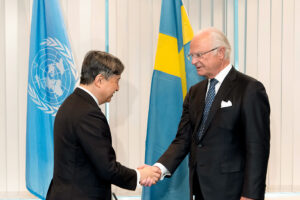Menstrual Hygiene Day focuses on lifting the barrier for education
Can you imagine not being able to go to school because you have your period? This is the reality for many people in high- and low-income countries. On 28 May, SIWI held a webinar on Menstrual Hygiene Day to discuss how to stop menstruation from being a barrier to education.
Everyone who menstruates must be given the opportunity to manage their menstrual cycle with dignity and in comfort, without worrying about bullying or cost of period products.
As Polly Heine from The Hygiene Bank in Edinburgh points out, it is often taken for granted that hygiene products such as soap and toilet paper are provided for free in bathrooms, so why is it not also assumed that period products should also be available without cost? This gave context to the campaign that led Scotland to pass the Period Products Bill and became the first country in the world to provide free access to period products to its entire population.
To achieve SDG4 – ensuring inclusive and equitable quality education for all – we need to make sure that infrastructure are in place for students to manage their menstruation with dignity. Teresa Calderón, from UNICEF sanitation programs in Bolivia, highlighted the need to provide adequate toilet facilities in schools. Sensitized educators are also crucial in supporting the students who have questions around their menstrual hygiene management. These discussions can lead to further dialogues around sexual and reproductive health.
Period policies need to be adopted everywhere, and it can start with an institution or workplace. By providing period products in public spaces and workplaces, even where non-menstruators are in the majority, support is shown for those who are menstruating, helping to end the taboo around periods.
Providing products in all toilet facilities, recognizes that not all of those who menstruate identify as women or girls, a point raised by Kerstin Isaxon from RFSU or the Swedish Association for Sexuality Education. This is especially important to take into account in education surrounding menstrual hygiene management.
Fair and safe access to sanitation services is vital for access to education and gender equality. SIWI is committed to mainstreaming gender equality across its projects and processes to ensure inclusion in a water wise world.








